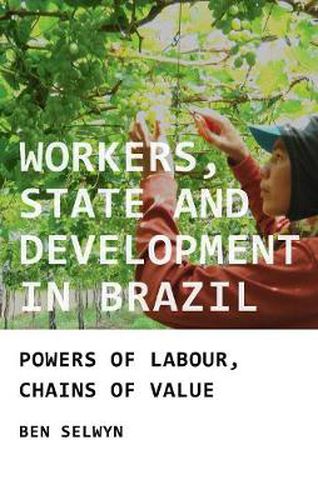Readings Newsletter
Become a Readings Member to make your shopping experience even easier.
Sign in or sign up for free!
You’re not far away from qualifying for FREE standard shipping within Australia
You’ve qualified for FREE standard shipping within Australia
The cart is loading…






How do changing class relations contribute to processes of capitalist development?
Within the study of development the importance of class relations is usually relegated to lesser status than the roles of states and markets in generating and allocating resources. This book argues that the changing balance of class forces between capital and labour are central to different patterns of capitalist development and that processes and outcomes of class struggle co-determine the form that development takes.
Workers, State and Development in Brazil illuminates these key issues in political economy through a detailed empirical investigation of the nexus between class dynamics and capitalist development in North East Brazil’s Sao Francisco valley. It details how workers in the valley’s export grape sector have utilized their structural and associational power to win concessions from employers, contributing to a progressive pattern of regional capitalist development.
The first chapter provides a stimulating evaluation and re-formulation of the Global Commodity Chains approach, and will be of wide-ranging interest to those interested in understanding how global dynamics impact on local developmental processes. The book will appeal to students and researchers interested in processes of capitalist development, class formation and dynamics, North East Brazilian political economy and International Political Economy.
$9.00 standard shipping within Australia
FREE standard shipping within Australia for orders over $100.00
Express & International shipping calculated at checkout
How do changing class relations contribute to processes of capitalist development?
Within the study of development the importance of class relations is usually relegated to lesser status than the roles of states and markets in generating and allocating resources. This book argues that the changing balance of class forces between capital and labour are central to different patterns of capitalist development and that processes and outcomes of class struggle co-determine the form that development takes.
Workers, State and Development in Brazil illuminates these key issues in political economy through a detailed empirical investigation of the nexus between class dynamics and capitalist development in North East Brazil’s Sao Francisco valley. It details how workers in the valley’s export grape sector have utilized their structural and associational power to win concessions from employers, contributing to a progressive pattern of regional capitalist development.
The first chapter provides a stimulating evaluation and re-formulation of the Global Commodity Chains approach, and will be of wide-ranging interest to those interested in understanding how global dynamics impact on local developmental processes. The book will appeal to students and researchers interested in processes of capitalist development, class formation and dynamics, North East Brazilian political economy and International Political Economy.